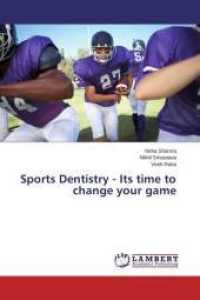Full Description
Equine Applied and Clinical Nutrition is a landmark text that provides a comprehensive source of information on the nutrition and feeding management of horses. In this authoritative and accessible account, experts from around the world provide a global perspective while the editors tackle key controversial areas. Topics covered include the basic foundations of equine nutrition (digestive and metabolic physiology, nutrient functions and requirements), nutritional management by life stage or function, the assessment of feedstuffs and feeding programs, and clinical nutrition. Also included is discussion on feed hygiene and the role of manufacturers in feed quality and safety. The book contains abundant practical nutritional advice for the treatment of clinical conditions seen by veterinarians in their daily practice, together with the fundamental information needed to make recommendations for the nutritional management of healthy horses.
Equine Applied and Clinical Nutrition provides the most substantial overview currently available of the nutritional management of key equine clinical conditions. It further presents the up-to-date scientific background needed to underpin recommendations. It will be of core relevance to equine veterinarians and nutritionists, and a valuable resource for undergraduate and graduate students, as well as lay horsemen and women who wish to be better informed about their horses' nutritional needs.
Comprehensive coverage of key topics in equine nutrition, both from a scientific and applied perspective
Practical advice with clear take-home messages
Accessible text with many summary boxes, illustrations and graphics to emphasize important concepts and recommendations
Likely to become the standard reference for practical nutrition in the equine field
Contents
SECTION 1: CORE NUTRITION
Digestive physiology
Metabolic physiology
Feeding behaviour
Research techniques in equine nutrition
Energy
Amino acids and protein
Fats and fatty acids
Carbohydrates
Vitamins
Minerals
Water
SECTION 2: APPLIED NUTRITION AND FEEDING MANAGEMENT
A. General considerations
Feedstuffs for horses
Pastures and pasture management
Supplements and nutraceuticals (including ergogenics)
Ration evaluation and formulation (with discussion on feed manufacturing practices)
International feeding practices
B. Feeding through the lifestages
Broodmare and stallion
Growing animals
Mature horses
Old horses
Athletic horses (possibly several chapters under this heading - a basic core chapter, then a group of small chapters that deals with different disciplines e.g. racehorses, endurance, 3-day event)
C. Special considerations
Ponies, donkeys, miniature horses
Wild equids
Orphan foals
.
SECTION 3: CLINICAL NUTRITION
Clinical assessment of nutritional status
Muscle disorders
Laminitis
Obesity
Thin and starved horses
Endocrine diseases (equine metabolic syndrome; equine Cushing's disease)
Developmental orthopaedic disease
Osteoarthritis
Gastrointestinal diseases (gastric ulcers, colic, diarrhea)
Allergic and inflammatory airway diseases
Renal and hepatic
Skin diseases/atopy
Central nervous system diseases (e.g. equine motor neuron disease; grass sickness)
Behavioural abnormalities (stereotypies)
Assisted enteral and parenteral feeding
Feed-related toxicities
APPENDICES
Nutrient requirements
Nutrient composition of feeds
Reference ranges for blood metabolites, minerals and vitamins
Milk composition








